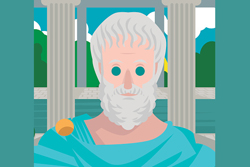
by Cié Gee, Ed.D, Director of Registration and Records, The University of Texas - San Antonio
At the AACRAO Annual Meeting in Orlando, Stephen Shirreffs from Stanford University took us on a trip into the rhetorical past. His session explored how Aristotle can make you a better communicator.
Rhetoric, the study of communication between author and audience, was one of the basic disciplines taught when the university was first created. Therefore, it stands to reason that those of us working in this field should take time to understand the rhetorical nature of our jobs.
Shirreffs presented the concept of authors and audiences in a different way than we may be used to knowing. An author is any person communicating to another person; and that person is thus the audience. Any author has an ethos or a stance. As higher education professionals, we communicate in some form to many audiences and we may take an authoritative stance with students or a collaborative stance with colleagues.
Unfortunately, sometimes your audience maybe unknown. Audiences can be Real or Intended, Internal, Implied or Imagined.
Shirreffs discussed that there is a dialectical nature of ethos or an opposite.
-
Authority and Authenticity - Authority used to reside within the person because of who they were. Now we have a tendency to not trust authority, we have become obsessed with authenticity
-
Eloquence and Mystery - We know how Hamlet ends, but we see it anyway for the eloquence of it all.
-
Knowledge and Uncertainty - We are in the knowledge business, it's true or it's not true, it's a record or it's not, what rule can we find and apply to reduce our uncertainty?
The main take away is to build arguments on things that are shared. You are stronger when you lead with an argument that is based on a value proposition in which you imply in your audience and embody in your ethos.